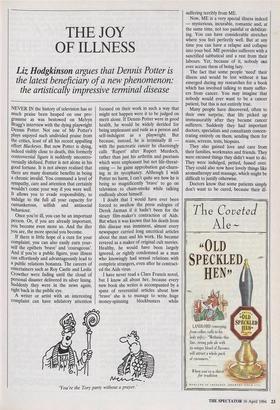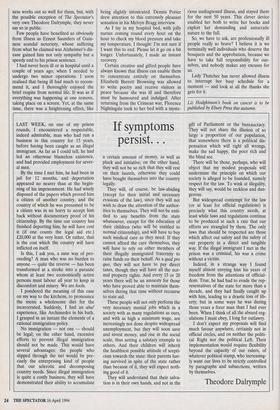THE JOY OF ILLNESS
Liz Hodgkinson argues that Dennis Potter is
the latest beneficiary of a new phenomenon: the artistically impressive terminal disease
NEVER IN the history of television has so much praise been heaped on one pro- gramme as was bestowed on Melvyn Bragg's interview with the dying playwright Dennis Potter. Not one of Mr Potter's plays enjoyed such undivided praise from the critics, least of all his recent appalling effort Blackeyes. But now Potter is dying, indeed visibly close to death, this formerly controversial figure is suddenly uncontro- versially idolised. Potter is not alone in his good fortune. It is not always realised that there are many dramatic benefits in being a chronic invalid. You command a level of sympathy, care and attention that certainly wouldn't come your way if you were well. It allows you to evade responsibility, to indulge to the full all your capacity for cantankerous, selfish and antisocial behaviour.
Once you're ill, you can be an important person. Or, if you are already important, you become even more so. And the iller you are, the more special you become.
If there is little hope of a cure for your complaint, you can also easily earn your- self the epithets 'brave' and 'courageous'. And if you're a public figure, your illness can effortlessly and advantageously lead to a public relations bonanza. The careers of entertainers such as Roy Castle and Leslie Crowther were fading until the cloud of personal disaster delivered its silver lining. Suddenly they were in the news again, right back in the public eye.
A writer or artist with an interesting complaint can have adulatory attention
focused on their work in such a way that might not happen were it to be judged on merit alone. If Dennis Potter were in good health, he would be widely derided for being unpleasant and rude as a person and self-indulgent as a playwright. But because, instead, he is terminally ill with the pancreatic cancer he charmingly calls 'Rupert' after Rupert Murdoch, rather than just his arthritis and psoriasis which were unpleasant but not life-threat- ening — he gains approbation gut-churn- ing in its sycophancy. Although I wish Potter no harm, I can't quite see how he is being so magnificently 'brave' to go on television to chain-smoke while talking endlessly about himself.
I doubt that I would have ever been forced to swallow the press eulogies of Derek Jarman if it hadn't been for the sleazy film-maker's contraction of Aids. But when it was known that his death from this disease was imminent, almost every newspaper carried long uncritical articles about the man and his work. He became revered as a maker of original cult movies. Healthy, he would have been largely ignored, or rightly condemned as a man who knowingly had sexual relations with complete strangers, even after he contract- ed the Aids virus.
I have never read a Clare Francis novel, but I know all about her, because every new book she writes is accompanied by a spate of reverential articles about how `brave' she is to manage to write huge money-spinning blockbusters while
'You're the Tory party without a prayer.'
suffering terribly from ME.
Now, ME is a very special illness indeed — mysterious, incurable, romantic and, at the same time, not too painful or debilitat- ing. You can have considerable stretches where you feel perfectly well. But at any time you can have a relapse and collapse into your bed. ME provides sufferers with a sanctified sabbatical and a rest from their labours. Yet, because of it, nobody can ever accuse them of being lazy.
The fact that some people 'need' their illness and would be lost without it has emerged during my researches for a book which has involved talking to many suffer- ers from cancer. You may imagine that nobody would ever want to be a cancer patient, but this is not entirely true.
Many people have discovered, often to their own surprise, that life picked up immeasurably after they became cancer sufferers. Suddenly they had important doctors, specialists and consultants concen- trating entirely on them, sending them for scans, screens, tests, biopsies.
They also gained love and care from their families, workmates and friends. They were excused things they didn't want to do. They were indulged, petted, fussed over. They could also now have lovely things like aromatherapy and massage, which might be difficult to justify otherwise.
Doctors know that some patients simply don't want to be cured, because their ill- ness works out so well for them, but, with the possible exception of The Spectator's very own Theodore Dalrymple, they never say so in public.
Few people have benefited so obviously from illness as Ernest Saunders of Guin- ness scandal notoriety, whose suffering from what he claimed was Alzheimer's dis- ease gained him not only sympathy but a speedy end to his prison sentence.
I had never been ill or in hospital until a couple of years ago, when I needed to undergo two minor operations. I soon realised that being ill had much to recom- mend it, and I thoroughly enjoyed the brief respite from normal life. It was as if everything was happening at one remove, taking place on a screen. Yet, at the same time, there was a heightening effect, like being slightly intoxicated. Dennis Potter drew attention to this extremely pleasant sensation in his Melvyn Bragg interview.
As I lay in my hospital bed, with jolly nurses coming round every hour on the hour to check my blood pressure and take my temperature, I thought: I'm not sure if I want this to end. Please let it go on a bit longer. Unfortunately, I made an instant recovery.
Certain creative and gifted people have always known that illness can enable them to concentrate entirely on themselves. Elizabeth Barrett Browning was allowed to write poetry and receive visitors in peace because she was ill and therefore must be humoured and indulged. After returning from the Crimean war, Florence Nightingale took to her bed with a myste- rious undiagnosed illness, and stayed there for the next 50 years. This clever device enabled her both to write her books and exploit her demanding and autocratic nature to the full.
So, we have to ask, are professionally ill people really so brave? I believe it is we terminally well individuals who deserve the bouquets and the approbation, because we have to take full responsibility for our- selves, and nobody makes any excuses for us.
Lady Thatcher has never allowed illness to interrupt her busy schedule for a moment — and look at all the thanks she gets for it.
Liz Hodgkinson's book on cancer is to be published by Ebury Press this autumn.



























































 Previous page
Previous page